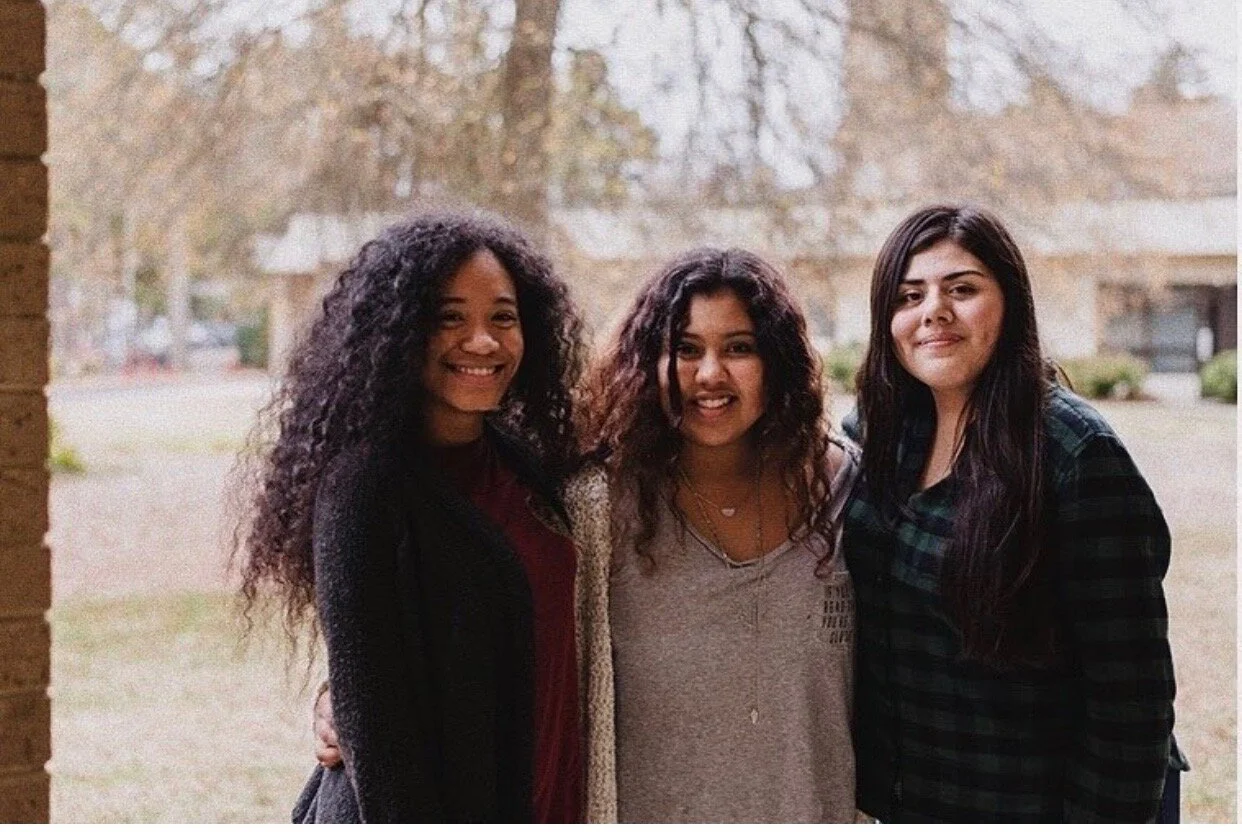This is post 5/5 in a series highlighting students on “The 20-Year Journey” at UrbanPromise. UP's holistic, long-term support of students from Kindergarten to college graduation and beyond is what sets our program apart, and we couldn't empower our students without you. Thank you so much for committing to our students for the long haul!
Picture this:
According to the Pell Institute, 26% of low-income, first-generation college students leave higher education after their first year. Only 34% of this same group of students earn a bachelor’s degree after six years.
They say a picture is worth a thousand words, but only one word seems needed when considering statistics like these: troubling.
Would a thousand questions make more sense, then? Or perhaps a thousand solutions?
Maybe. But if you show these statistics to CiCi, she has something else to offer in return.
CiCi has a story.
WHAT ARE YOU DOING?
Many of you already know CiCi — four years ago she joined our UrbanPromise staff as the StreetLeader Director at UP’s South Boulevard Site. Additionally, in the last year she has taken ownership over UP’s StreetLeader Mentoring Program.
CiCi is also a first-generation college student.
“I was a strong student in high school — I was graduating top of my class,” CiCi recalls. “But it was the summer before my senior year before I even thought about college.”
Like many other first-generation students, applying to college felt, to CiCi, like stepping into a foreign land. It wasn’t until her guidance counselor asked her about the SAT — which she had not yet taken — that CiCi realized she might be behind in the process.
“It wasn’t that I didn’t have plans in my mind, but nobody had really stopped and asked ‘what are you doing?’” CiCi recalls. “I had no idea what I should be preparing for.”
CiCi’s family had no experience with the process and, thus, was not familiar with the myriad of application requirements and deadlines. Additionally, her hardworking single mom didn’t have a lot of extra time to dig into it with her.
Despite these challenges, CiCi was successful in earning college acceptance, and ultimately she enrolled at Pacific Azusa University. In hindsight, though, she recognizes that she “wasn’t smart in playing the application game” and “had no idea what I was biting off with finances.”
Still — a success story, right?
That depends on where you think the story ends.
Liz (middle) with two other StreetLeader Alumni
ONE JOURNEY ENDS, ANOTHER BEGINS
“Right off the bat in college, I had a lot of trouble academically,” Liz recalls.
Liz is a 2018 StreetLeader Alumni — she was a StreetLeader at our South Boulevard Site during her 10th & 11th grade years, and then she used her leadership experience to help launch a new UrbanPromise site in East Charlotte as a senior.
Like CiCi, Liz is also a first-generation college student.
“I remember thinking college wasn’t for me just because of the financial aspect,” Liz recalls. “I didn’t see how I could afford it. But UP really helped with FAFSA and helped us find scholarships. Especially with the language barrier, it can be hard for parents to know how to help.”
With guidance and empowerment from the UP staff, Liz earned acceptance to several schools and chose to enroll at UNC-Asheville. Her accomplishment was enormous and rightfully called for celebration. And who better to celebrate with Liz than someone like CiCi — another young woman who has also felt the joy of this particular achievement?
CiCi enjoys celebrating with students, but she also never loses sight of what might lie ahead.
“Every pitfall you can think of [entering college as a first-generation student], I experienced,” CiCi says. “I was as prepared as I could be academically, but I hadn’t built habits around how to keep my grades up with the new freedom. Also, how do I balance school with a part-time job?”
Lots of new college students experience academic challenges — it’s not uncommon for newfound independence to distract newbies of all backgrounds and abilities.
But, for CiCi, academic challenges were only the tip of the iceberg. Like many first-generation students of color who attend “PWIs” (Primarily White Institutions), CiCi felt alone, confused, and very out of place.
“I immediately experienced homesickness and culture shock, and I didn’t have anybody to reach out to who would understand that,” she remembers. “UP offers an early culture of caring for mental health, but that was not something I was familiar with. I had no healthy coping mechanisms for anxiety and depression. I almost lost my scholarships, and I found myself in unhealthy spaces that could have jeopardized my entire future.”
It was a deeply difficult season for CiCi, but it’s also the part of her story that now gives her such exceptionally clear vision.
While many of us are scratching our heads over why 26% of first-generation college students might leave higher education after only a single year, CiCi is busy getting to work.
SOMEWHERE TO TURN
Like CiCi, the academic challenges Liz found herself wresting with during her freshman year were more of a symptom than a primary indicator of her preparedness or ability. The root of her struggle was something much more complex.
“The legal process started during my senior year and then dragged into freshman year too,” Liz recalls.
Her father was facing deportation to El Salvador, and the uncertainty of his fate paralyzed her, taking a massive toll on her ability to focus.
Like CiCi, Liz was also trying to find her place as a young woman of color on a primarily white campus.
Coming from “a space like UP where there is so much love and support from people who you feel comfortable around”, Liz found the transition to a new environment to be lonely.
But this is the point where CiCi’s and Liz’s stories diverge. Because, unlike CiCi, Liz knew exactly where to turn.
“One of my biggest support systems through all of it was UrbanPromise,” Liz recalls. “Just the constant checking in — staff would mention me for prayer, StreetLeaders would text me to check in on me. When I was dealing with a lot of shame [due to academic performance], I received love and affirmation that my circumstance played the biggest part in that — it was not a reflection of who I am, as a student or as a person.”
Also, UrbanPromise ensured that Liz would continue to receive free access to the crucial mental health counseling services that she had engaged in as a StreetLeader. She met weekly with her counselor via Zoom, which she credits to helping her maintain healthy coping strategies through a very stressful time.
WHAT IS THE COST IF WE’RE STOPPING SHORT?
Liz, now a rising senior, is back on track and is thriving. Her passion for community work — inspired by UP! — has deepened over the last three years, and now she is considering furthering her education to pursue a masters degree in either social work or in public policy.
Liz has had to challenge a lot of statistics to get to where she is today. And it’s stories like her’s that have encouraged our team at UrbanPromise to ask one particular question when we consider the statistics surrounding the success of first-generation college students:
What is the cost if we’re stopping short?
Over the last eight years, UrbanPromise has done our best to support our growing number of StreetLeader Alumni. But even someone like Liz, who has certainly benefitted from that effort, can graciously acknowledge its limitations.
“It’s understandable when UrbanPromise hasn’t been able to reach out, because they have other jobs running sites and everything,” she says. “But being able to have an actual point person who is in charge of StreetLeader Alumni and a system designed specifically for Alums — that will make a big difference.”
After eight years of offering informal measures of support to our StreetLeader Alumni as they navigate college, UrbanPromise Charlotte is launching our official Alumni Support Program this summer! And as for the “point person” Liz mentioned…
We can think of no better person to launch and direct this program than CiCi!
Aside from all of the crucial support and guidance she knows this program will offer students, CiCi is excited for the potential of the Alumni Support Program to build out the ‘Restore Community’ piece of UrbanPromise’s vision.
“There’s a difference between students saying ‘I know what my passion is’ and them saying ‘I want to be a leader’. How do we bring students back into the city to become leaders? How do we look for ways to amplify their voices, to leverage their experiences? How can we partner with leaders already established in the city? I want to really start connecting our StreetLeader Alumni to that ‘Restore Community’ piece.”
THE 20-YEAR JOURNEY
Over the last six weeks, we’ve explored “The 20-Year Journey” of an UrbanPromise student together. This last stretch of the journey — a student’s college years and her first steps into restorative leadership — is the final, critical stretch, and one where we’re inviting you to grow with us!
The cost of stopping short is simply too high: If first-generation college students like CiCi and Liz aren’t able to defy statistics, it doesn’t only impact them. We all lose out on the vision and fruits of their leadership. And at UrbanPromise, we believe that their leadership is exactly what our city, and the world, needs.
We could not do any of this without you. Thank you for allowing us to deepen and expand the ways we empower our students so that they can, in turn, work to revitalize our city, and the world!






